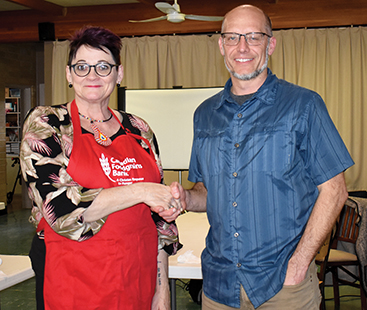Church minister seeks support for ‘healing’ event
Posted on March 31, 2022 by Maple Creek Rev. Michele Rowe, from Maple Creek United Church, is pictured with Rick Block, Saskatchewan regional representative for Canadian Foodgrains Bank. Block presented Rowe with a red chef's apron bearing the Foodgrains Bank logo.
Rev. Michele Rowe, from Maple Creek United Church, is pictured with Rick Block, Saskatchewan regional representative for Canadian Foodgrains Bank. Block presented Rowe with a red chef's apron bearing the Foodgrains Bank logo.A church minister is seeking support for a community event to heal divisions wrought by the COVID-19 pandemic.
The Rev. Michele Rowe, from Maple Creek United Church, hopes other churches will back her idea.
One suggestion is for a big barbeque, although nothing concrete has been planned.
“I believe we need something to bring us together,” she said. “There have been deep divisions in the community.”
The Rev. Rowe raised the possibility of a healing event after being inspired by a presentation by Rick Block, Saskatchewan regional representative at Canadian Foodgrains Bank.
Block’s 90-minute presentation featured a slideshow outlining the mission and work of the Winnipeg-based organization, a short film about an Ethiopian farmer trained in conservation agriculture, and a question-and-answer session.
About 10 people attended the event at the United Church on Thursday, March 24. Among them were United Church congregants and an Anglican Church member.
Canadian Foodgrains Bank is a partnership of 15 churches and church-based agencies whose mission is to end global hunger. They work with locally based organizations in developing countries to meet emergency needs, achieve long-term solutions to hunger and try to garner support for this international cause from Canadians and governments.
Through the Government of Canada’s support, the Foodgrains Bank’s agencies leverage donations from individuals, churches and businesses up to a ratio of 4:1 for food aid in the developing world; up to $25 million each year.
Last year, Foodgrains Bank approved funding of food assistance for 337,031 people experiencing humanitarian emergencies in Tanzania, Congo, Ethiopia, Madagascar, Mauritania, Nigeria, Sudan, Somalia, Uganda, Zimbabwe, Afghanistan, Lebanon, Syria, Yemen, Colombia, Nicaragua and Venezuela.
Block, whose wife Jacquie is also a Saskatchewan regional representative at Foodgrains Bank, asked the question: Why are people hungry?
He gave several answers: inequality, conflict, climate change and natural disasters.
Food system failures, he added, were worsened by the COVID-19 pandemic.
Block said Canadian Foodgrains Bank members and locally based partners were responding to the Ukraine crisis. As the conflict continues, millions are fleeing Ukraine, searching for safety in mostly neighbouring countries: Poland, Slovakia, Hungary, Romania and Moldova. Food is getting harder for people to access.
“Refugees are tired and hungry,” said Block. “Our mandate is to respond to immediate needs.”
He showed a slide of people carrying food boxes from a truck.
“We are providing hot meals or food vouchers,” he said.
During a Q&A session, Block was asked about Foodgrains Bank’s structure, how it responded on the ground to crises, and administration costs.
A 2021 annual report available at the meeting shows that Foodgrains Bank’s revenues were $55.1 million, while expenses came to $46.9 million, of which $1.6 million were administration costs. This left an operating surplus of $8.1 million.
Afterwards, the Rev. Rowe said she believed something could be done to bring Maple Creek together after 18 months of dealing with COVID-19, a pandemic that caused community divisions over mask-wearing and vaccine mandates.
Block said he would be willing to help with a community event.
“I would totally commit to it,” he said.
If you would like to volunteer, email Foodgrains Bank at volunteer@foodgrainsbank.ca or call 1.800.665.0377 and ask to speak with Ashli.


Leave a Reply
You must be logged in to post a comment.